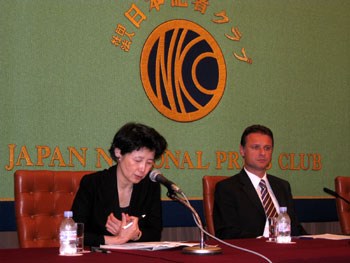In the opening part, the minister described the bilateral relations between Croatia and Japan as very good, singling out the parliamentary cooperation as particularly well developed
In the opening part, the minister described the bilateral relations between Croatia and Japan as very good, singling out the parliamentary cooperation as particularly well developed. He pointed out that Croatia appreciates Japan’s considerable contribution to its post-war reconstruction through various development programs and assistance in mine action.
Minister Jandroković dedicated most of his presentation before 40 or so leading Japanese journalists to presenting Croatia’s main foreign-policy goals since its gaining of independence – full-fledged NATO and EU membership.
He expressed conviction that Croatia’s continuous efforts in satisfying the membership criteria had already paid off, and that after joining NATO Croatia expects to become the 28th EU member soon.
Analyzing the current political situation in Europe’s southeast, Minister Jandroković said that Croatia’s joining the EU would send a positive message to the other countries in the region.
The fundamentals of Croatia’s foreign policy are the preservation and strengthening of peace and understanding between countries and nations, continued the minister, pointing out that that pertained to Croatia’s neighbours as well as the foreign-policy activities across the international community.
As a confirmation that said foreign-policy guidelines are being implemented, Minister Jandroković mentioned the presence of the Croatian contingent in ISAF, Afghanistan. The goal of the Croatian mission is to strengthen the country’s security situation, support the setting up of Afghan military forces, and reconstruct the country. Apart from Afghanistan, Croatia is also present in 13 international peacekeeping missions worldwide, led by NATO, the EU and the UN.
As an important aspect of the Croatian foreign policy the minister pointed out the strengthening of Croatia’s economy by promoting it own economic capacity and attracting foreign capital.
The journalists inquired about the situation in the region and Croatia’s view on the current political situation in Bosnia and Herzegovina, Serbia, and Kosovo. Minister Jandroković reiterated that the Euro-Atlantic perspective is the best guarantee of those countries’ peace and stability, and that Croatia even after it joined the EU would continue to transfer its experiences and assist the countries of the region along their road to NATO and the EU.
The questions also concerned the break-up of former Yugoslavia, war responsibility and the International War Crimes Tribunal. Minister Jandroković countered the claim that a civil war had gone on in Croatia with a series of facts clearly stating that it had actually been Serbia’s aggression under the regime of Slobodan Milošević against Croatia, Slovenia, Bosnia and Herzegovina, and later on Kosovo, which had led to its years-long international isolation.
Answering questions about the economic perspective of and the possibilities of investing in Croatia, Minister Jandroković pointed out that Croatia is open to foreign investment and has an exceptionally favourable geographical position due to the shortest link with the countries of Central and Eastern Europe. The Far East investors have thus shown increased interest in Croatia’s ports, through which companies from that part of the world could export their products.
Press releases


